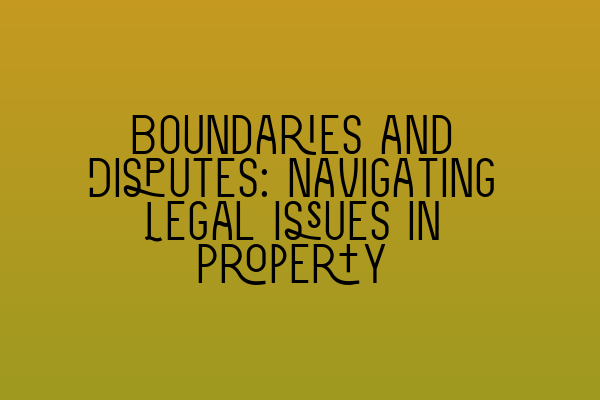Boundaries and Disputes: Navigating Legal Issues in Property
Welcome to the SQE Property Law & Land Law blog, where we aim to provide you with comprehensive and insightful articles on various legal topics. Today, we are going to delve into the complex world of boundaries and disputes in property law. Whether you are a homeowner, property investor, or legal professional, understanding the legal framework surrounding property boundaries and resolving disputes is essential.
What are Property Boundaries?
In property law, boundaries refer to the lines that separate one property from another. These boundaries can be physical or legal in nature, and they play a crucial role in determining the rights and responsibilities of property owners. However, establishing and maintaining clear boundaries is not always a straightforward process, which often leads to disputes.
Common Boundary Disputes
Boundary disputes can arise due to various reasons, such as:
- Unclear or poorly defined boundaries
- Disagreements over the ownership of a particular piece of land
- Encroachments by neighboring properties
- Inaccurate boundary measurements
- Disputed access rights
These disputes can quickly escalate and cause significant stress and financial burden for all parties involved. As a property owner, it is crucial to have a solid understanding of your rights and obligations to effectively resolve these disputes.
The Role of Legal Professionals
When faced with a boundary dispute, it is highly recommended to seek advice from a qualified property law solicitor. A solicitor specializing in property law can provide you with expert guidance, negotiate on your behalf, and help you navigate the complex legal process.
Legal professionals at SQE Property Law & Land Law have extensive experience in handling boundary disputes. They can analyze land registry records, title deeds, and other relevant documents to determine the legal position of your property and identify potential solutions for resolution.
Navigating the Legal Process
Resolving a boundary dispute often involves various stages, including:
- Gathering evidence: It is essential to collect all relevant documents, including surveys, title deeds, and historical records, to support your claim.
- Negotiation: In many cases, a boundary dispute can be settled through negotiation and mediation. A skilled solicitor can help you communicate with the other party and work towards a mutually agreeable solution.
- Court proceedings: If negotiation fails to resolve the dispute, legal action may be necessary. Your solicitor will guide you through the court process and ensure your rights are protected.
- Enforcement of court orders: If a court order is issued in your favor, it is essential to ensure it is enforced. Your solicitor can assist you in enforcing the order and recovering any damages awarded.
It is worth noting that the legal process can be time-consuming and costly. Therefore, early legal intervention and professional advice are crucial in maximizing the chances of a favorable outcome.
Conclusion
Boundary disputes in property law can be complex and emotionally fraught. Seeking the assistance of a qualified property law solicitor is vital to protect your rights and interests. The legal professionals at SQE Property Law & Land Law have the expertise and experience to help you navigate through these disputes and ensure a fair resolution.
For more information on property law, boundary disputes, and other legal topics, please explore our related articles:
- SQE 1 Practice Exam Questions
- SQE 1 Practice Mocks FLK1 FLK2
- SQE 2 Preparation Courses
- SQE 1 Preparation Courses
- SRA SQE Exam Dates
If you have any specific questions or would like to discuss a potential boundary dispute, please feel free to contact us at SQE Property Law & Land Law. Our dedicated team is here to assist you.
